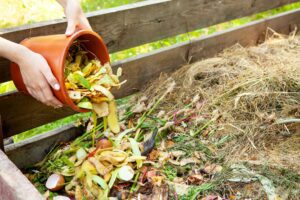Backyard Composting
Feeding the soil in the yard is the key to any successful garden and backyard composting is one of the best ways to feed your soil. Compost adds nutrients, helps conserve moisture and increases worm activity – creating a strong and healthy garden.
Why compost
It’s a free way to re-use your household waste and create nutritious soil for your garden. It’s also environmentally friendly and chemical free.
Compost bins
You can start your own compost in an old bin, a specific compost bin, an old wooden box, or just a heap on the ground. Choose a spot in your garden that is well-drained and has some shade, as too much sun will dry out the compost.
What to compost
A good compost heap is made up of green matter (nitrogen), brown matter (carbon), oxygen, and water. If you only use green matter you will end up with a smelly pile of rotting greens. If your compost is mainly brown matter, then it can take years to break down. A good balance of the two, will ensure a balanced mix that will decompose into compost. Green matter includes vegetable and fruit scraps, grass cuttings and coffee grounds. Brown matter includes egg shells, brown paper and dry leaves.

How to compost
Layer your different matters, green matter, then brown, some soil and then water and keep repeating.
Make sure you turn the compost weekly to give it oxygen. Use a garden fork. Cover your compost to keep it moist and not dry out.
Regularly turned compost will be ready to use as rich soil within 6-12 months.
What goes in your compost
Here is a list of things that can and cant go in to your backyard compost:
YES
fruit and vegtable scraps
used tea bags
coffee grounds
eggshells
lawn clippings
leaves
green plant cuttings
weeds without seeds
brown paper
cardboard
straw
plant cuttings
fire ashes
animal manure
old flowers
NO
dairy
meat
fish
bones
large branches
pet poo (except chickens)
weeds with seeds
glossy paper
treated timber
cooking fat / oil
Want more gardening tips? Check out our other gardneing blog posts:






